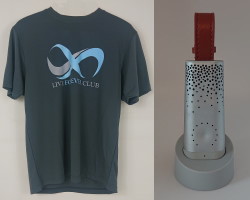In the realm of biomedical research, extending life is not just a theme of mythical quests but a tangible prospect within our grasp. Recent studies using mouse models have identified potential molecular targets that could significantly extend lifespan, promising a future where aging could be more graceful and less debilitating.
The Quest for Longevity
As of 2019, the World Health Organization reports over a billion people aged over 60. This number is expected to rise dramatically, reaching 1.4 billion by 2030 and doubling by 2050. These statistics not only highlight the increasing importance of geriatric care but also underscore the urgency in advancing anti-aging therapies to improve societal well-being.
For decades, mice have served as proxies to unravel the complexities of human biology, owing to their physiological and genetic similarities to humans. Lifespan extension research often relies on these small but significant creatures to predict potential human outcomes. Despite their utility, translating these findings to human conditions is fraught with challenges, primarily due to differences in lifespan and disease progression between mice and humans.
Molecular targets that could change the game
As researchers delve deeper into the biology of aging, they've uncovered several molecular targets whose manipulation in mouse models has resulted in significant extensions of lifespan. These discoveries are not just pivotal for understanding aging but could be transformative if applicable to human health. Here are the key targets identified and the roles they play:
Mammalian Target of Rapamycin (mTOR)
This complex protein plays a central role in regulating cell growth, protein synthesis, and autophagy. Studies have shown that inhibiting mTOR with drugs like rapamycin can extend the lifespan of mice significantly. This pathway is particularly intriguing because it suggests that aging may be delayed by modulating nutrient-sensing pathways, potentially mimicking the effects of caloric restriction without the need to alter diet drastically.
AMP-Activated Protein Kinase (AMPK)
Known as the "energy sensor" of the cell, AMPK activates during low energy states such as exercise or calorie restriction. Activating AMPK has been shown to extend lifespan in mice by improving cellular energy processes and reducing inflammatory responses, which are often linked to various age-related diseases.
Insulin-Like Growth Factor 1 (IGF1)
This hormone plays a crucial role in childhood growth and continues to have anabolic effects in adults. Research indicates that reduced IGF1 signaling contributes to increased lifespan in various species, including mice. The pathway’s involvement in cell growth and metabolism makes it a compelling target for interventions aimed at mimicking the beneficial effects of dietary restriction.
Sirtuins
These NAD+-dependent deacetylases are important regulators of lifespan in lower organisms and are believed to play a similar role in mammals. Sirtuins influence aging through their role in epigenetic regulation, stress resistance, and metabolic efficiency. Enhancing sirtuin activity has shown promise in extending the lifespan of mice, possibly by promoting a more youthful metabolic profile and reducing the wear and tear of cellular stress.
Telomerase Reverse Transcriptase (TERT)
Telomerase adds repetitive nucleotide sequences to the ends of chromosomes, thus protecting them from damage and the effects of aging. Overexpression of TERT in mice has led to extended lifespans through improved regenerative capacity and reduced age-related pathologies. This target is particularly fascinating due to its dual role in promoting cellular immortality and its implications in cancer biology.
Fibroblast Growth Factor 21 (FGF21)
This hormone is a key player in the regulation of metabolism and has been shown to extend lifespan in rodents. FGF21 mediates its effects through actions on the liver, adipose tissue, and the brain, improving metabolic health and increasing resistance to various stressors. Its ability to mimic a state of fasting makes it a unique target for potentially mimicking the beneficial effects of caloric restriction.
NAD+ Precursors
As organisms age, levels of NAD+ naturally decline, which is linked to age-related metabolic decline and increased disease risk. Supplementation with NAD+ precursors, such as nicotinamide riboside, has been shown to improve mitochondrial function and extend lifespan in mice by boosting the levels of this crucial molecule.
These molecular targets represent the forefront of aging research. Their study not only aids in our understanding of the fundamental processes that drive aging but also sets the stage for developing therapies that could delay the onset of age-related diseases and extend human healthspan. Each target, from energy metabolism to genetic stability, offers a unique angle from which to combat the effects of aging, providing multiple pathways that could eventually lead to effective anti-aging therapies in humans.
Human benefits
The journey from mouse models to human applications is complex and requires careful consideration of biological differences and potential risks. Each molecular target presents unique challenges in clinical translation. For instance, while mTOR inhibitors show promise in mice, their immunosuppressive effects in humans require cautious handling. Similarly, therapies aimed at enhancing telomerase activity must balance the benefits of delayed aging against the potential risks of cancer.
Several clinical trials are currently underway to test these findings in human subjects. These trials are crucial for determining the safety and effectiveness of potential anti-aging therapies and represent a significant step towards practical applications.
The implications of extending human lifespan are profound. Beyond the personal benefits of longer, healthier lives, societal structures and healthcare systems would need adaptation to accommodate an older, more vibrant population. Furthermore, as research progresses, the ethical considerations of lifespan extension will become increasingly pertinent.
As we stand on the brink of these developments, it is an exciting time for science and medicine. The success of these interventions in humans could herald a new era of longevity, fundamentally altering our understanding of aging and disease.
The research on lifespan extension offers a beacon of hope for a future where aging is not synonymous with decline. With continued support and rigorous scientific investigation, the dream of significantly extended, healthier human lives could become a reality. Let's embrace the possibilities and support the scientific endeavors that aim to unlock the secrets of longevity.
The study, led by Alexey Moskalev at Lobachevsky State University of Nizhni Novgorod is published in the Expert Opinion on Therapeutic Targets.








